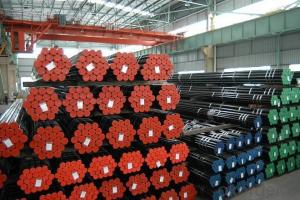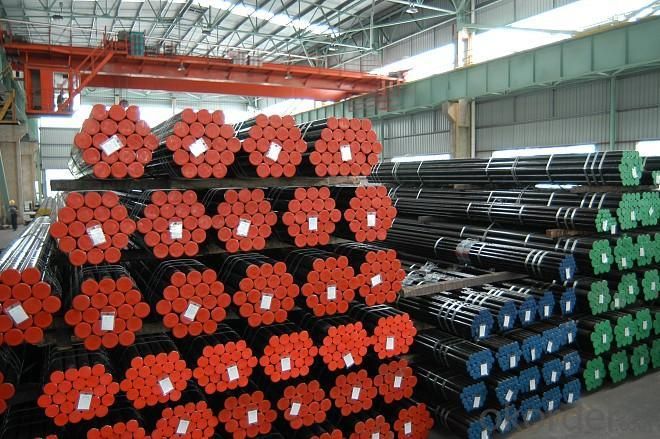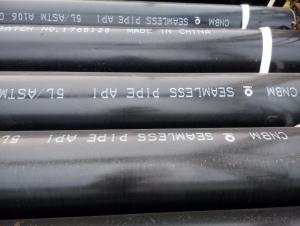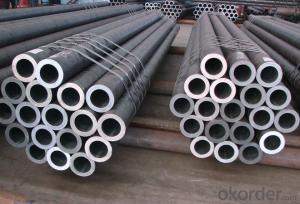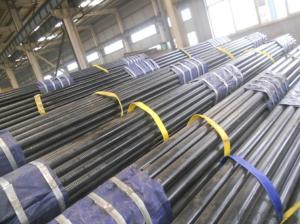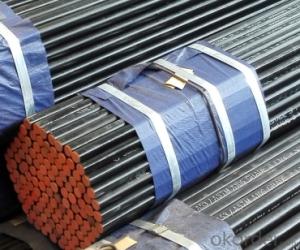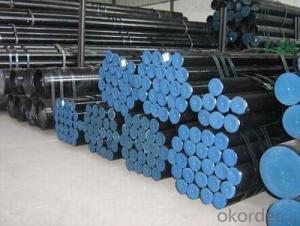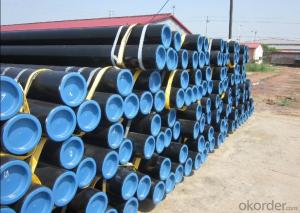Carbon Steel Seamless Steel Pipe API 5L ASTM A106
- Loading Port:
- Tianjin
- Payment Terms:
- TT OR LC
- Min Order Qty:
- 25 m.t.
- Supply Capability:
- 10000 m.t./month
OKorder Service Pledge
OKorder Financial Service
You Might Also Like
1、Structure of Carbon Steel Seamless Steel Pipe API 5L ASTM A106:
Seamless pipe is formed by drawing a solid billet over a piercing rod to create the hollow shell. As the manufacturing process does not include any welding, seamless pipes are perceived to be stronger and more reliable. Historically seamless pipe was regarded as withstanding pressure better than other types, and was often more easily available than welded pipe.
2、Main Features of the Carbon Steel Seamless Steel Pipe API 5L ASTM A106:
• High manufacturing accuracy
• High strength
• Small inertia resistance
• Strong heat dissipation ability
• Good visual effect
• Reasonable price
3、Carbon Steel Seamless Steel Pipe API 5L ASTM A106 Specification:
Standard | GB, DIN, ASTM ASTM A106-2006, ASTM A53-2007 |
Grade | 10#-45#, 16Mn 10#, 20#, 45#, 16Mn |
Thickness | 8 - 33 mm |
Section Shape | Round |
Outer Diameter | 133 - 219 mm |
Place of Origin | Shandong, China (Mainland) |
Secondary Or Not | Non-secondary |
Application | Hydraulic Pipe |
Technique | Cold Drawn |
Certification | API |
Surface Treatment | factory state or painted black |
Special Pipe | API Pipe |
Alloy Or Not | Non-alloy |
Length | 5-12M |
Outer Diameter | 21.3-610mm |
Grade | 20#, 45#, Q345, API J55, API K55, API L80, API N80, API P110, A53B |
Standard | ASME, ASTM |
1) Material:20#(ASTM A 106/A53 GRB.API5LGRB,GB),45#,16Mn,10#.
2) Specification range:OD:21.3-610mm,WT:6-70mm,length:6-12m or according to the requirement of clients.
3) Excutive standards:GB,ASME API5L.ASTM A 106/A53,Despite of the above standards,we can also supply seamless steel pipe with standard of DIN,JIS,and so on,and also develop new products according to the requirements of our clients!
4) Surface:black lacquered,varnish coating or galvanized.
5) Ends:Beveled or square cut,plastic capped,painted.
6) Packing:bundles wrapped with strong steel strip,seaworthy packing.
4、Packaging & Delivery
Packaging Details: | seaworthy package,bundles wrapped with strong steel strip |
Delivery Detail: | 15-30days after received 30%TT |
5、FAQ of Carbon Steel Seamless Steel Pipe API 5L ASTM A106:
①How is the quality of your products?
Our products are manufactured strictly according to national and internaional standard, and we take a test
on every pipe before delivered out. If you want see our quality certifications and all kinds of testing report, please just ask us for it.
Guaranteed: If products’ quality don’t accord to discription as we give or the promise before you place order, we promise 100% refund.
②How about price?
Yes, we are factory and be able to give you lowest price below market one, and we have a policy that “ for saving time and absolutely honest business attitude, we quote as lowest as possible for any customer, and discount can be given according to quantity”,if you like bargain and factory price is not low enough as you think, just don’t waste your time.Please trust the quotation we would give you, it is professional one.
③Why should you chose us?
Chose happens because of quality, then price, We can give you both.Additionally, we can also offer professional products inquiry, products knowledge train(for agents), smooth goods delivery, exellent customer solution proposals.Our service formula: good quality+good price+good service=customer’s trust
SGS test is available, customer inspection before shipping is welcome, third party inspection is no problem
- Q: How do you prevent freezing in steel pipes during cold weather?
- To prevent freezing in steel pipes during cold weather, there are several measures that can be taken: 1. Insulate the pipes: Insulation is an effective way to protect steel pipes from freezing. Use insulation sleeves or wraps to cover the pipes, especially in areas where they are exposed to cold temperatures. Insulation helps retain heat and prevents the pipes from reaching freezing temperatures. 2. Seal any air leaks: Check for any gaps or openings around the pipes where cold air can enter. Use caulking or weatherstripping to seal these gaps and prevent cold air from reaching the pipes. 3. Maintain a consistent temperature: Ensure that the area where the pipes are located is adequately heated and insulated. Keeping the temperature above freezing will help prevent the pipes from freezing. If the pipes are exposed to extremely low temperatures, consider using heat tape or pipe heating cables to provide additional warmth. 4. Allow water to flow: Running a small, continuous trickle of water through the pipes can help prevent freezing. The flowing water generates heat and inhibits the formation of ice within the pipes. However, this method should only be used as a last resort, as it can waste water. 5. Drain the pipes: If the steel pipes are in an area that is not regularly used or if freezing weather is expected, it may be advisable to drain the pipes completely. Turn off the water supply and open all faucets to allow the water to drain out. This eliminates any standing water that could freeze and cause the pipes to burst. It is important to note that prevention is key, as frozen steel pipes can lead to costly damages and water leaks. By implementing these measures, you can protect your steel pipes and ensure they remain functional during cold weather.
- Q: The difference between 12Cr1MoVG alloy steel tube and 15CrMo
- 15CrMo is a steel Pearlite Heat-resistant steel, has high heat resistance at high temperature (b = 440MPa) and antioxidant activity, and has certain ability of anti hydrogen corrosion. Because of the high content of Cr, C and other alloy elements in steel, the tendency of hardening of steel is obvious, and the weldability is poor.
- Q: What are the factors that affect the pressure rating of steel pipes?
- There are several factors that can affect the pressure rating of steel pipes. These include the material and grade of the steel used, the wall thickness of the pipe, the diameter of the pipe, the temperature at which the pipe will be operating, and the type of fluid or gas being transported through the pipe. Additionally, factors such as corrosion, external loads, and installation methods can also impact the pressure rating of steel pipes.
- Q: How big is the seamless steel tube of DN50?
- Domestic steel pipe diameter is generally divided into A series and B series, DN50 pipe diameter of 60mm and 57mm respectively, the wall thickness should be based on your design pressure, temperature, pipe material to calculate.
- Q: What is the role of steel pipes in sewage systems?
- The role of steel pipes in sewage systems is to provide a durable and reliable means of transporting wastewater and sewage from homes, businesses, and other sources to treatment plants or disposal sites. Steel pipes are known for their strength, corrosion resistance, and longevity, making them suitable for withstanding the harsh and corrosive nature of sewage. They are capable of handling high-pressure flows and can withstand the weight and pressure of the surrounding soil. Additionally, steel pipes are often used in larger diameter applications due to their ability to carry larger volumes of sewage efficiently.
- Q: What are the different types of coatings applied to steel pipes?
- There are several types of coatings that can be applied to steel pipes. Some common ones include fusion-bonded epoxy (FBE) coating, polyethylene (PE) coating, polypropylene (PP) coating, and zinc coating. These coatings serve various purposes such as corrosion protection, insulation, and enhancing the pipe's durability.
- Q: Can seamless steel pipe and ordinary steel pipe be welded?
- Seamless steel tube branch and seamed two, seamed steel pipe welding is formed, all two can be welded together, if you do not allow the use of seam tube cannot connect.
- Q: What are the common methods for inspecting the integrity of steel pipes?
- Common methods for inspecting the integrity of steel pipes include visual inspection, ultrasonic testing, magnetic particle testing, radiographic testing, and pressure testing.
- Q: Can steel pipes be used for solar energy systems?
- Yes, steel pipes can be used for solar energy systems. Steel pipes are commonly used for the construction of solar water heating systems and solar thermal collectors. They are durable, resistant to corrosion, and can efficiently transport hot water or heat transfer fluids, making them suitable for various solar energy applications.
- Q: What is the thickness of steel pipes?
- The thickness of steel pipes varies depending on the specific application and type of pipe used. Typically, steel pipes are available in various thicknesses, measured by their schedule or wall thickness. Schedule 40 is the most common schedule for steel pipes, known for its standard wall thickness. However, for applications demanding higher strength or pressure resistance, thicker pipes with higher schedules like Schedule 80 or Schedule 160 are also available. Moreover, the thickness of steel pipes can be tailored to meet specific project requirements.
Send your message to us
Carbon Steel Seamless Steel Pipe API 5L ASTM A106
- Loading Port:
- Tianjin
- Payment Terms:
- TT OR LC
- Min Order Qty:
- 25 m.t.
- Supply Capability:
- 10000 m.t./month
OKorder Service Pledge
OKorder Financial Service
Similar products
Hot products
Hot Searches
Related keywords
